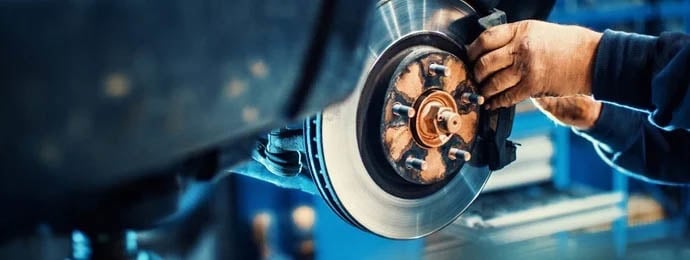My Lease Vehicle Has Developed A Fault, What Are My Rights?
When you lease a new car or van from Nationwide Vehicle Contracts, all of our vehicles come with the UK manufacturer’s warranty. This means that if something goes wrong with your lease vehicle during the warranty period (excluding certain limitations and wear and tear) you shouldn’t have to pay to fix any faults.
But what do you do if your lease vehicle develops a fault whilst it is still under warranty and what are your consumer rights regarding the product?
To answer some customer concerns regarding repairing a lease vehicle that is still under warranty, Nationwide Vehicle Contracts has put together a short guide to explain what type of repairs are covered and what to do if your lease vehicle develops a fault.

“A manufacturer’s warranty is a guarantee provided by the vehicle manufacturer that contractually obliges them to make certain repairs to your car should it go wrong within the stated warranty period.”

Manufacturer warranties vary. Some cover the vehicle for just one year from the point of registration, others for up to three years and some, such Hyundai (five years) and Kia (seven years) offer longer warranty periods. There is also varying mileage limitations depending on each manufacturer/vehicle. You can find out the warranty period for your vehicle by opening the ‘General’ Tab in the specific vehicle ‘Technical Specification’ section on our website, by visiting the manufacturer’s website or by speaking to a Nationwide Vehicle Contracts adviser on 0345 811 9595.
Generally, the manufacturer’s warranty covers all major mechanical/electronic components on your car such as:
- Engine
- Transmission system
- Fuel and ignition systems
- Cooling system
- Electrical items
- Gearbox
- Steering
- Suspension
- Brake system parts
As each policy varies from manufacturer to manufacturer, it is important to check exactly what you’re are covered for before making a claim.
You can also read more about car warranty on our Car Warranty Explained guide.
What is not covered by the car warranty?
Most manufacturer’s warranties exclude any parts or repairs affected by wear and tear such as:
- Brake linings, disc pads & discs
- Clutch wear due to driving style
- Tyres and wheels
- Exhaust system
- Catalytic converter
- Wiper blades
- Seat, backrest and floor coverings
- Batteries for key fobs and alarms
- Damage to bodywork, paintwork, glass and headlights
- Damage to audio equipment and satellite navigation systems
Your vehicle warranty may also be invalid if you:
- Miss any manufacturer scheduled services
- Use an 'unauthorised garage' for any repairs, maintenance or servicing
- Make any modifications to the car
- Make any repairs to the vehicle due to signs of neglect
- Use unapproved fuel, lubricants or non-OEM approved parts
- Cause damage to a component by your driving style or other external factors
My lease car has developed a fault, what happens next?
If your lease car develops a fault whilst it is still under the manufacturer's warranty, you must contact the Nationwide Vehicle Contracts Customer Service team on 0345 811 9595 (option 3) who will advise you what to do next. It may be that you need to contact your finance provider, or the manufacturer direct, but we will be happy to advise you on the best course of action.
If the fault relates to a mechanical component and your lease vehicle is still covered under warranty, you will need to take it to your nearest approved dealership to allow them to inspect the vehicle. Depending on manufacturer, you may get the use of a courtesy car whilst repairs are being completed, although this is a complimentary service and isn't always available.

The fault hasn't been fixed, what are my consumer rights?
If the fault persists, and frequent and inconvenient trips to the dealer fails to sort the problem out, then you may want to investigate your consumer rights.
According to the website Consumer Rights Expert, all new cars are covered by The Consumer Rights Act 2015 (which replaced The Sale of Goods Act 1979) and this Act states that all new cars should not only be "as described" and "fit for the purpose for which they were bought", but also "of satisfactory quality".
The Consumer Rights Act 2015 was introduced to simplify things and help those purchasing products to hold retailers to account, so it is vitally important that when your car arrives that you check it over immediately and let us know of any problems straight away. Visit our Taking Delivery of Your New Lease Car guide for a handy checklist of what to check when signing for your vehicle.
With most lease vehicles, the finance company is the registered owner and keeper of the vehicle so it is important that you inform them of any faults with the vehicle. Depending on the fault, the finance company may take up the fault direct with the manufacturer in order to speed things up. Either way, it is important that you inform them of any issues you may have with the vehicle during your lease contract. You can find out the contact number for your finance provider by logging into your Customer Account area.
What if I can't get a satisfactory conclusion with the manufacturer?
If you have difficulty agreeing a solution with the manufacturer, you may want to consider contacting the Society of Motor Manufacturers and Traders (SMMT) if all other avenues have been exhausted. The SMMT act as an arbitrator between yourself and the manufacturer/dealer to help resolve any disputes. You can also contact Trading Standards and take legal advice, although if you do end up going to court, a solicitor will cost you money. Both the RAC and the AA also offer legal advice to their members.
Have any other questions regarding leasing a vehicle? Speak to one of our experienced sales consultants on 0345 811 9595 or visit our How Leasing Works page.
Guide Information
Originally published: 9th February 2017
Last updated: 29th December 2022
